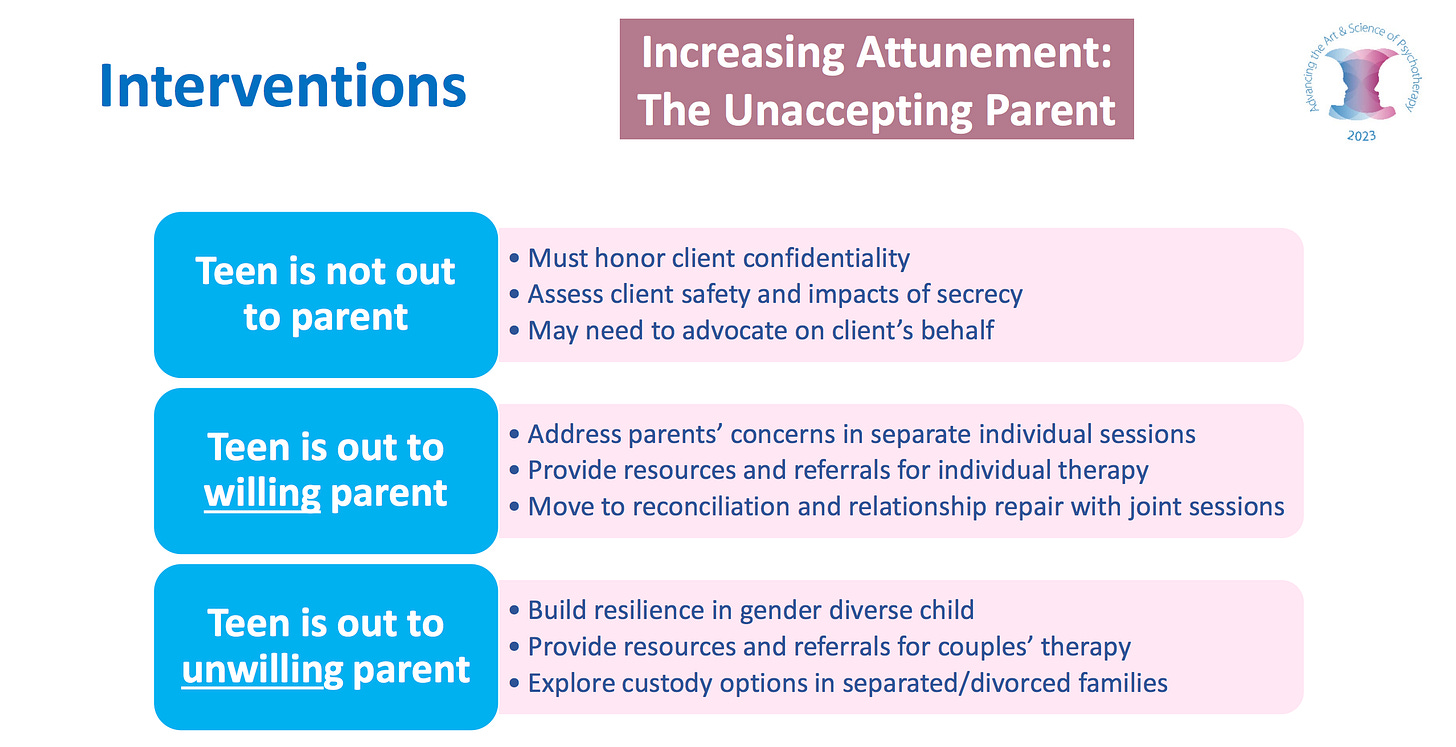Empathetic Manipulation
Class on how to "support" parents of "gender diverse" children
Reposted from Pamela’s Newletter
Pamela Garfield-Jaeger is a licensed clinical social worker in California.
On May 5, I attended the California Association of Marriage and Family Therapy (CAMFT) conference in Santa Clara, California. In my third installment about this conference, I'm going to talk about the class entitled: Parents in Transition, Clinical Considerations when treating Parents of Gender Diverse Children. Presented by Linda K. Reeves, LMFT (she/her) WPATH GEI Certified Gender Specialist.
Mrs. Reeves introduced herself as a “cis-gendered heterosexual woman”. She went on to say, “I understand that I’m looking through a lens of privilege and limited experience by the fact that I’m not trans or non-binary. I am the very proud mother of a gay son who came out in the 7th grade and that really was the inspiration to specialize in my master’s curriculum in the LGBT specialization”. She continued by stating that we live in a “cis-superior” culture and that got her “very agitated” and motivated her to become a trans activist.
This woman seemed to come from a place or caring and was very proud of her ability to be such a strong “ally”. She taught the class from a place of empathy for parents who are “grieving” the loss of their “cis” child. In fact, as part of her training, she reviewed the stages of grief by Elisabeth Kubler-Ross: Denial, Anger, Bargaining, Depression and Acceptance. She believes that it is the therapist’s job to encourage a parent to accept their child as trans, and not ask any questions. If parents do not acknowledge their child as transgender, no matter the circumstances, they are in the denial phase of grief.
Slide from presentation, using the stages of grief model for parents who do not accept their child as transgender.
If parents have questions, or believe that their child is masking another mental health issue, it is transphobic. It’s not “intentional transphobia”, but transphobia nonetheless.
She categorized parents into three types: Transformers-parents who “have the capacity to accept their child as trans” (this seems to be her ideal), Transphobics-parents who “view their child as an extension of themselves and aren’t comfortable with a transition”, and Transporters-parents who “purge themselves of any transphobic thoughts and can be too affirming.” She described the transporters as concerning as well because they aren’t letting the child “lead the bus”.
Throughout the presentation, Mrs. Reeves used the metaphor “getting ‘em on the bus” referring to convincing parents that they must blindly affirm their child’s transgender identity (but not too much). She used empty phrases like “increasing attunement”, “psychoeducation” and “creating a new narrative” to describe ways to influence those parents to ride that transgender bus. She also stated that it is not the child or the parents fault for the transphobia, it’s the system at large. “It’s not the identities that creates the problem, it’s the systemic oppression that creates the problem”, she stated. (If you find this confusing, you are not alone.)
Slide featuring interventions and “myths” about trans people. These are are strawman arguments used to invalidate real concerns a parent may have.
Linda Reeves spoke about soft approaches for much of the presentation, however, she continued to instruct the class that if parents do not affirm their child’s transgender identity, to call Child Protective Services.
Mrs. Reeves also directed the room full of therapists to keep a child’s transgender identity secret from the parents if the child is not “out”, and to always favor the affirming parent in custody situations.
Slide on what to do with “The Unaccepting Parent”. We have moved from a model where mental conditions are treated to a model that treats others to accept mental conditions and punishes them if they do not.
Mrs. Reeves reinforced the worldview that if a child states they are transgender, even as a toddler, they should be believed. Here she referenced Diane Ehrensaft, PhD, a clinical psychologist at UCSF. Ehrensaft believes when a pre-verbal girl is pulling her out hair barrettes, this is a “gender message”. Diane said the same for a young boy in a onesie; if he unsnaps it, he is communicating that he wants to be wearing a dress and therefore wants to be a girl. (Again, if you feel there is a problem with this, you are not the only one.)
Clip of Dr. Ehrensaft discussing how pre-verbal children give “gender messages”.
There was a brief moment in Mrs. Reeves lecture where she contradicted herself and stated there are rare circumstances when a child may be seeking attention with a transgender identity. However, she had no explanation on how a therapist could discern when these cases arise. At the end of the lecture I asked how one can tell when a child might not be “true trans” and she floundered trying to answer my question. In the end, she had no answer.
My takeaway from this class is most therapists have been manipulated in their training to manipulate their clients. They believe they are are good by teaching parents how to be virtuous by affirming their questioning child’s chosen gender identity. Most therapists also believe the lies that puberty blockers are 100% reversible and cross-sex hormones are benign. They don’t consider the psychological harms of denying biological truth and allowing a developing child “lead”. They also don’t recognize how they are dividing children from loving parents. Plus, they don’t realize that they are being trained to be soldiers of profit for the medical industrial complex. Therapists believe they are saving children’s lives without thinking critically.
Most mental health professionals are kind and compassionate. They are also often naive and misguided. If you feel a therapist is manipulating you to do something you feel uncomfortable with, such as lead your child onto a dangerous path of hormones and surgeries, trust yourself and run.






This type of insider information is invaluable in showing how whole cohorts of professionals have been "brainwashed." Thanks for this and keep this kind of citizen journalism coming.
The best course of action is to NOT use therapists for their child unless they are 100 percent absolutely certain that therapist doesn't buy into gender ideology. Otherwise run fast the other way.
Therapists for the most part are much more harmful than helpful in most areas of life these days (unpopular opinion, but true). I have seen the havoc they inflict on families. It wasn't always that way.